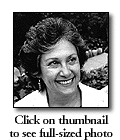Holda E. Dorsey
California Department of Education Director, Latino Adult Education Services Project, 1995-
Manager, US/Mexico Adult Literacy Project, 1991-93
Staff Development Manager, Outreach and Technical Assistance Network, 1989-93
Manager, CBE Staff Development Project, 1988-1989
Hacienda La Puente Unified School District Manager, Adult Education ESL Project, 1993-95
Coordinator, Adult Basic Education Department, 1970-83
Instructor, Adult Education, 1968-70, 1983-88
California Council for Adult Education State President, 1993-94
South Coast Section President, 1988-89
Mother and daughter adult literacy students.
Excerpt from an interview with:
HOLDA E. DORSEY by LINDA L. WEST
September 16 and 29, 1995
West Covina, California
DORSEY:
I had never in my life thought or dreamed that there were people who could not
read and write in this country. That was an eye-opener, you know. In a
third-world country, yes, there are an awful lot of people who cannot read or
write. There aren't enough resources to provide instruction to everybody who
could benefit from it. And I know Mexico has had a tremendous problem with
literacy because, especially in the outskirts, sometimes there are not enough
schools or they have schools but there are no teachers. In the big cities, the
problem is overcrowding. Classes are sixty, seventy students - and I'm talking
about elementary school and they have three shifts, you know. Horrendous! And
so it's understandable from a third-world country there are people who are
illiterate, but in a rich country like the United States, how could we have
people who are illiterate? It was just beyond my comprehension.
But it was interesting, too, to start working with them in teaching them. That was a new skill that I had not practiced at all, teaching them to read, and it was again trying to teach to read targeted to the job. That was interesting also. You know, how do you go about getting just the important content without neglecting the ability, the skill of reading? And getting the students to appreciate the skill of reading and practice it in their own life, you know, by learning to read and enjoying it, I found that challenging more than anything else.
I had one student that to me was fascinating. The woman was probably in her forties, several children, and she could not read at all. And one day she showed up with her seventeen-year-old daughter, who was a senior in high school, and she wanted her daughter to enroll in the class and to be accepted in the class. Well, I didn't know that she could bring her daughter, so I sent her to the counselor and the counselor said, "Yes, let her in." So Jenny, was the daughter, came to class, and that was a high school student, a senior, who couldn't read. Mother didn't know because Mother didn't read. Mother starts learning to read, Mother starts becoming proficient, starts asking daughter for help, and finds out daughter can't read. How did daughter manage to get all the way up to be a senior without being able to read? So, in talking to Jenny – that was another interesting thing she memorized everything. Every single thing. She heard the other students read, she memorize, memorized, memorized. Can you imagine what a beautiful mind? It's incredible that these people could be so bright and have such wonderful skills, and somewhere we were unable as teachers to help them to develop the skill of reading. Anyway, Jenny did beautifully. I mean, she just went through everything very quickly. All she needed was a little bit of attention and pointing her in the right direction. So she and her mother both finished very nicely. Jenny finished her high school and Mother finished her elementary school, and it was very rewarding to see that. That was a wonderful story and I had a wonderful time.

